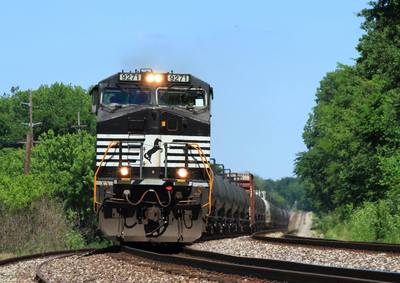
| Teach me how to live, O Lord. Lead me along the right path. . . . |
| Psalm 27: 11a |
 |
|
On Track
Trains have been on my mind a lot lately. In part, I think because a young friend of mine, seventeen-year-old Justin Sandlin, is just crazy in love with trains, and with photographing trains, and with sharing his stunning train photos on Facebook. (The gorgeous photo for this month's devotional, captioned, "On a scorching afternoon, a westbound manifest glides into the curve at Attica, Indiana. The train will soon cross the Wabash River," is courtesy of Justin. Thanks, Justin!) Since becoming Facebook friends with Justin, I've seen more trains than I've ever seen in my life! And that's saying a lot since I grew up in Lafayette, Indiana where, before railroad relocation, trains ran right through the middle of town and were a regular, and often frustrating, interruption of everyday life.
But I no longer think of trains as merely inconvenient interruptions. As I've written here before, a sermon illustration I once heard about trains is still with me. In speaking of why one would want to choose to do things God's way instead of one's own way, the pastor said, "A train runs freest on its tracks." The seven simple words and the truth of that analogy have stayed with me for more than thirty years. Obedience results in freedom, and not only freedom, but power and purpose!
When a scribe asked Jesus, "Which is the first commandment of all?" Jesus replied:
The first of all commandments is: Hear, O Israel, the Lord our God, the Lord is one. Mark 12: 29
The Hebrew word for "hear" is shema, a word that carries with it the triple meaning: "hear, listen, obey." The Shema is a prayer devout Jews still sing or speak every morning and evening. Obedience begins with hearing, followed by listening. That train on its tracks. If the train in the analogy is each of us, then what are the tracks?
For the sake of this study, I asked Justin about train tracks. Do the two rails serve different purposes? Have different names? "No, "he replied. "In curves, the rail to the outside is called the 'outside rail' and the inner one is called 'inner rail'. Both do the same job, keeping the flanged wheels inside the gauge." Well, that works for me. Whose life doesn't perpetually feel like going around a curve in which one can't see what's coming? And so, I suggest that the Inner Rail can be related to the next part of Jesus' reply to that scribe:
And you shall love the Lord your God with all your heart, with all your soul, with all your mind, and with all your strength. This is the first commandment. Mark 12: 30
and the Outer Rail to His conclusion:
And the second, like it, is this: You shall love your neighbor as yourself. There is no other commandment greater than these. Mark 12:31
Loving the Lord your God with all your heart, soul, mind, and strength is the Inner Rail heart condition that, balanced with its parallel Outer Rail action, loving your neighbor as yourself, keeps the train upright and moving. Being parallel, these rails don't touch. This is an important distinction.
God, and God alone, is to be the recipient of our heart-soul-mind-and-strength love. We are never called to love ourselves with all our heart, soul, mind, and strength. That would be narcissism. We are never called to love our neighbors with all our heart, soul, mind, and strength. That would be co-dependence. We are called to love our neighbors as we love ourselves. What do we do for ourselves that we should also do for our neighbor? We feed ourselves when we're hungry, rest when we're tired, seek comfort when we're hurting physically or emotionally, etc. This verse isn't about self-love; it's about the Golden Rule, doing for others what we would do for ourselves if we could, or would welcome others doing for us if we couldn't.
The train on its tracks can help us understand what, at first, sounds like a conundrum: that self-constraint results in the greatest freedom, power, and purpose for our lives. If you think about it, most of what Jesus said sounds like conundrum: lose your life to gain it, turn the other cheek, love your enemies, forgive and you will be forgiven, and so on. These ideas defy human logic because they're above and beyond human logic. The Inverted Kingdom is like that. When we're on track, when our "flanged wheels are inside the gauge," the Spirit of God who raised Jesus from the dead and lives in us (Romans 8:11) will empower us for the amazing journey into this Kingdom.
Daye Phillippo
August, 2013